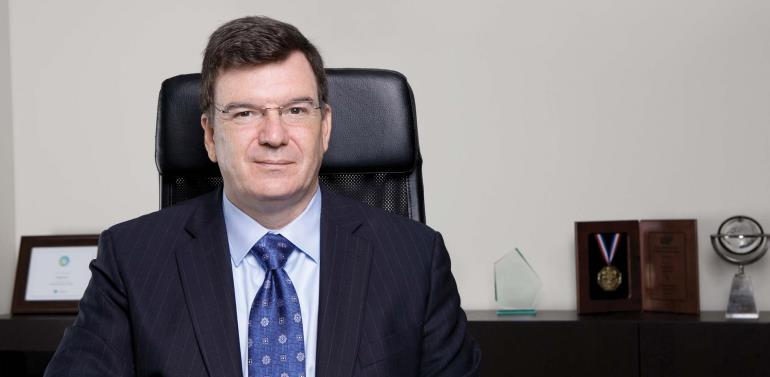Uncategorized
Miraah will be one of the largest solar plants ever built: Rod MacGregor

To help achieve our vision of creating a world-class solar industry here in Oman, we are also committed to hiring and developing local talent. We are proud to have achieved above 50 per cent Omanisation in record time, and are continuing to expand and hire for key positions. One of our local hires includes an ICV manager, who will ensure our ICV objectives and goals for Oman are achieved.
As more solar EOR projects are deployed, Oman’s workforce will develop greater expertise across solar technology innovation, project implementation and manufacturing. Experience with solar EOR will transfer to other energy-related sectors, fostering broader economic growth and diversification.
You recently signed up with Sustainable Square Oman for your CSR strategy and initiatives. What made you choose them?
We want to make a positive difference in Oman that extends beyond the benefits delivered to the oil & gas industry. By partnering with local experts embedded across Oman’s CSR landscape, we will be able to maximize our investment and create impactful projects to benefit Oman’s society, environment and economy. This will help us achieve the desired social impact on the communities in which we operate. Sustainable Square will help us translate this commitment to Oman and its people into high-impact programs and initiatives that will define our social investment strategy. We decided to partner with Sustainable Square due to its successful track record of developing differentiated, results-driven CSR initiatives for global businesses in Oman and the Gulf region.
How is the success of Miraah expected to impact clean energy technology (in specific Solar EOR) prospects in the global market?
Solar EOR is a long-term solution to extracting heavy oil, which makes up almost 70 per cent of the world’s remaining resources. Our solution is simple, and easy to deploy. It is also cost effective and environmentally friendly and it has already proven its success in Oman and California. Any country that has scarce gas resources, abundant sunshine and of course, heavy oil reserves, can benefit immensely from adopting solar EOR. Solar EOR can reduce an oil field’s gas consumption and carbon emissions by up to 80 per cent. This would reduce operating costs, protect the environment and free-up valuable gas resources for use in higher value applications. We all have a responsibility to ensure oil and gas is produced in a way that’s as environmentally responsible as possible.
The scope of Miraah truly underscores the massive market for deploying solar in the oil and gas industry. By targeting this untapped market, we are able to deploy solar at an unprecedented scale, allowing us to reduce emissions at a very significant level. People are starting to realize that clean energy can in fact power oil fields sustainably and economically. We believe that Miraah is only the beginning of the convergence of the oil and solar industries. It will pave the way for similar projects all over the world.
By using solar, we deliver substantial emissions reductions while accelerating solar deployment at unprecedented scale. And as scale increases, costs will continue to fall, accelerating a virtuous cost cycle. This could make solar a strong choice for any commercial project. There is tremendous opportunity to integrate what has historically been called alternative energy and traditional energy into a single energy industry. This energy convergence will not only lead to reduced emissions to help fight climate change, but will create vast economic opportunities.
What is the potential of Solar EOR in the MENA region? What efforts are you making to tap this?
Currently, many countries in the region import or allocate vast amounts of natural gas for use in thermal EOR. Burning natural gas for oil production is very wasteful, especially in countries where gas is a scarce resource. Solar EOR offers a compelling economic solution to any country producing heavy oil that has limited natural gas resources but enjoys abundant sunshine. As oilfields in countries such as Kuwait, Saudi Arabia and Bahrain, mature, they too will need EOR and many have already established pilot steam injection projects to test reservoir.
We established a direct business in Kuwait in early 2014 and appointed Hussain Shehab, a 30-year Kuwait Oil Company veteran, to lead the company’s operations in the country. Most recently, we also hired local energy expert, May Al Zanki, as our Sales and Business Development Director to support our expansion plans and help Kuwait sustainably develop massive heavy oil resources with solar steam rather than steam produced by burning imported natural gas.
-

 Banking & Finance2 months ago
Banking & Finance2 months agoOman Oil Marketing Company Concludes Its Annual Health, Safety, Environment, and Quality Week, Reaffirming People and Safety as a Top Priority
-

 News2 months ago
News2 months agoJamal Ahmed Al Harthy Honoured as ‘Pioneer in Youth Empowerment through Education and Sport’ at CSR Summit & Awards 2025
-

 OER Magazines2 months ago
OER Magazines2 months agoOER, December 2025
-

 News2 months ago
News2 months agoAI Security Conference 2025 Hosted by Securado Highlights the Changing Cybersecurity Landscape
-

 Insurance1 month ago
Insurance1 month agoSupporting Community Wellness: Liva Insurance Sponsors Muscat Marathon 2026 with Free Health Checkups
-

 Interviews1 month ago
Interviews1 month agoEXCLUSIVE INTERVIEW: TLS Rebranding Marks Strategic Leap Toward Innovation, Sustainability & Growth
-

 Insurance4 weeks ago
Insurance4 weeks agoLiva Insurance Supports Community Wellness Through “Experience Oman – Muscat Marathon 2026”
-

 Investment2 weeks ago
Investment2 weeks agoLalan Inaugurates Its First Overseas Manufacturing Facility, Marking Sri Lanka’s First Investment in SOHAR Freezone






























You must be logged in to post a comment Login